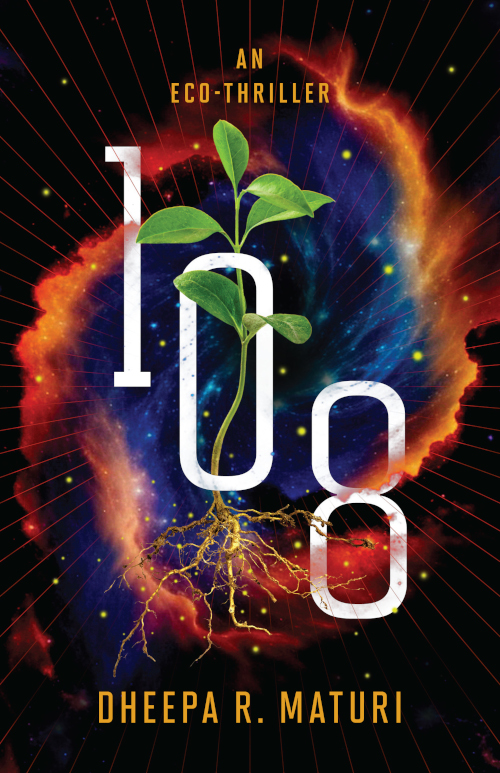Click here to return to the world eco-fiction series
About the Book
108: An Eco-Thriller (Girl Friday Productions, June 2025): While working the night shift at a San Francisco news agency, Bayla Jeevan has a shocking out-of-body experience. Her consciousness is transported deep into an Indian forest, where she witnesses a noxious liquid spreading through the soil. At the same time, she receives a message from her father, presumed dead for fifteen years, warning her of imminent danger. Coincidence? Unlikely.
Halfway around the world, agrochemical corporation ZedChem—led by billionaire Krakun Zed—tests its latest innovation, a product heralded as the solution to topsoil erosion. But the data reveals something else entirely.
As Bayla sets out looking for answers, she learns more about her past—and her family’s connection to a secret organization with ancient roots, and to Zed himself. Will Bayla be able to stop the corporation from devastating the planet before global agriculture and human existence are ruined forever?
In this action-packed eco-thriller, the bonds of family—and the power to save Earth—are put to the test.
Chat with the Author
Mary: Hi Dheepa. Welcome to Dragonfly. Tell us something about your life that not many people know about.
Dheepa: I’m fascinated by dance as a vehicle for storytelling and studied classical Indian dance for years. While I find the intricate footwork and emotional expressiveness compelling, I am most interested in the way this art form preserves and conveys ancient tales and philosophies. I’ve also always enjoyed group dancing, as a means to generate joy, upliftment, and (in the words of Dacher Keltner, author of Awe: The New Science of Everyday Wonder and How It Can Tranform Your Life) “collective effervescence” in a community. My most recent class was Texas line dancing, which I loved!
Mary: What led you to the creative outlet of writing?
Dheepa: I’d say I was always a writer, even in childhood. In fact, one of my earliest memories is repurposing a gift of origami paper to record my own poems! Writing, especially writing poetry, was my way of trying to understand the world, particularly when it felt utterly incomprehensible to me. Growing up between cultures generated a number of disconnects that I needed to navigate, and putting my confusion and pain and wonder into words was tremendously helpful.
Mary: What writing communities are you a part of, and how do they help?
Dheepa: I’m part of a poetry critique group in which each member truly strives to deliver honest feedback balanced with support and encouragement. Regular critique helps me remember that revision and editing are fundamental to the writing process, and it’s allowed me to develop a thicker skin and more receptive mindset around feedback. It’s also been a lovely forum in which to celebrate each other’s victories. I also belong to the Indiana Writer’s Center, a large group of writers from across the state. It’s wonderful to meet regularly with those who are also immersed in the writing life, which has a very particular set of challenges, and also to learn about multiple avenues of creative expression that members pursue.
Mary: Tell us about 108 and what inspired it, or was it accidental?
Dheepa: 108 is about an Indian-American woman who learns she possesses an ancient ability that can stop a global ecological collapse—if she’s strong enough to use it. When I committed to a regular writing practice ten years ago, I wrote mostly about culture, identity, and diaspora, but those themes quickly interwove with the environmental and ecological themes that were deeply important to me. This union of themes eventually led me to write an eco-thriller, which brings the elements of a thriller—the ticking clock, the high stakes, and the overwhelmingly powerful antagonist— into the context of the environment and climate change.
Mary: How does your book align with nature and place?
Dheepa: Nature and place are at the very heart and center of 108, whose primary topic is soil extinction. It’s easy to think of soil as merely the dirt under our feet, but in reality, it’s an extraordinary ecosystem replete with microorganisms that give our food all of its nutritional content. Sadly, half of the soil across the globe has been severely degraded, and a food crisis now looms before us. I hoped that writing a page-turner would help readers understand and grapple with this painful topic, but in a way that was also engaging. In 108, a chemical magnate is about to poison the soil with a product designed to force exponential growth from it. However, that product doesn’t account for the way natural processes occur and unfold, and instead jeopardizes agriculture across the globe.
Mary: Does your book have a message, or do you consider it more a piece of art? Or both?
Dheepa: The primary message of 108 is don’t despair. When I began writing 108, it seemed to me that so many environment-related books in the world were deeply despairing, and I became concerned. What if those stories were making us despair? What if they were making us assume that total climate catastrophe was a foregone conclusion? I wanted to put a more optimistic story into the world, which acknowledged our true reality—that we do indeed have the time, resources, and ingenuity to solve this crisis. I wanted that story to show that, as individuals, we have power and agency, and as a community, we can have a tremendous impact.
Mary: What’s your greatest experience in nature that somehow profoundly moves your work?
Dheepa: It was a deep and rich experience, but certainly not a comfortable one! My husband booked us into a Peruvian eco-lodge that took many hours by plane, car, and boat to access. When we finally arrived, I realized one entire wall of our “room” was missing, and that we were fully exposed to the rainforest’s heat and moisture, creatures and critters. I struggled during that trip, but it also helped me to comprehend the way in which Nature is primed and oriented to grow, bloom, burst, thrive with such power and tenacity. The fact that so many landscapes and species across the globe are now dying under our watch is an indictment of the way we are living upon and affecting the planet.
Mary: When you were growing up, what was your favorite story?
Dheepa: I know you asked for only one, but the first three books of Madeleine L’Engle’s “Time Quintet” feel like a single book in my mind! L’Engle’s writings gave voice to so many concepts that made intuitive sense to me as a child, but that I rarely heard or read. A Wrinkle in Time showed me that, when individuals turn inward, they can find vast strength and wisdom. A Wind in the Door showed me that what occurs on a micro level is reflected at a macro level; in other words, how we treat our bodies, our world, and our lives, impacts the entire collective. A Swiftly Tilting Planet showed me that small actions and incidents can have an effect far beyond our own lives and communities; as such, we must be conscious of our actions, efforts, and even words.
Mary: Three is great! What’s next for you?
Dheepa: I’m putting together a collection of my essays exploring the themes of culture, identity, and ecology, through the lens of my Indian-American background and experiences. I am hoping to examine and at times interrogate the human relationship with the planet. I am also working on a sequel to 108!
Mary: Is there anything else you want to talk about?
I’ve often wondered why it’s so easy to turn away from environmental issues. At first, I thought it was because those issues aren’t necessarily transpiring right in front of us. Then, I began to realize that many of us are experiencing what’s called ecological grief for the escalating losses of landscapes and species across the globe. Naming what I was feeling helped me to face those losses. It helped to speak and write about my grief.
Mary: Thank you, Dheepa. I’m looking forward to your essays, and thanks for contributing to our Earth via storytelling.
About the Author

Dheepa R. Maturi is a New York–born, Midwest-raised Indian-American writer who explores the intersection of identity, culture, and ecology, especially through hope in the face of ecological grief. She has been nominated twice for the Pushcart Prize, and her essays and poetry have appeared in numerous literary journals and anthologies. She lives with her family in the Indianapolis area.
